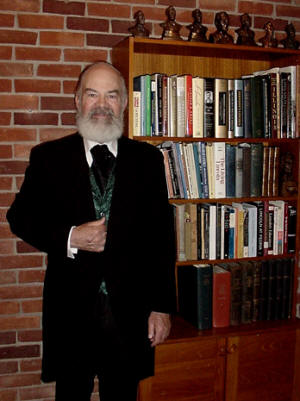|
 Native
Lincolnite publishes article on Lincoln's political rhetoric Native
Lincolnite publishes article on Lincoln's political rhetoric
 Send a link to a friend
Send a link to a friend
[May 08, 2014]
SPRINGFIELD, MO - The lead article in
the recently published issue of the Journal of the Abraham Lincoln
Association (JALA) is an 11,000-word composition by D. Leigh Henson,
professor emeritus of English at Missouri State University. The
title of the article is ďClassical Rhetoric as a Lens for Reading
the Key Speeches of Lincolnís Political Rise, 1852Ė1856.Ē JALA ďis
the only journal devoted exclusively to Lincoln scholarship.Ē JALA,
published twice a year by the University of Illinois Press, selects
only a few article submissions, and articles published have been
revised by their authors according to critiques provided by several
anonymous scholars. Henson, a native of Lincoln, Illinois, attended
Lincoln College and earned undergraduate and graduate degrees in
English at Illinois State University.
|
|
 Hensonís article discusses communicative elements in several of
Lincolnís speeches just before, during, and after he began his
celebrated, second political career in 1854. Lincoln returned to
politics after his undistinguished one term in Congress ended in
1849, so that he could oppose efforts to expand slavery into new
territories and the free states. Lincolnís return to politics
involved him in helping to establish the Illinois Republican Party
in 1856. His party leadership in turn led to the 1858
Lincoln-Douglas debates, then to his 1860 presidential election. Hensonís article discusses communicative elements in several of
Lincolnís speeches just before, during, and after he began his
celebrated, second political career in 1854. Lincoln returned to
politics after his undistinguished one term in Congress ended in
1849, so that he could oppose efforts to expand slavery into new
territories and the free states. Lincolnís return to politics
involved him in helping to establish the Illinois Republican Party
in 1856. His party leadership in turn led to the 1858
Lincoln-Douglas debates, then to his 1860 presidential election.
The communicative elements Henson discusses in Lincolnís speeches
derive from classical rhetoricóthe work of Greek and Roman writers
who established the field of study dealing with the theory,
practice, and instruction of discourse. Henson explains that
familiarity with classical rhetoric enables readers to gain a better
understanding of how Lincoln adapted the content, organization, and
style of his speeches to suit his political purposes and audiences.
Some of Lincolnís key speeches of this period refute Senator Stephen
A. Douglasís position that local governments in new territories
should decide whether to allow slavery. Lincoln argued that slavery
is a national, not a local, problem. Lincoln found the solution to
slavery grounded in the principle of the Declaration of Independence
that ďall men are created equal.Ē Lincoln insisted that slavery
should be confined to Southern states, where the Constitution
allowed it and where it would eventually die out. Lincolnís
political rhetoric benefited from his lawyerly ability to expose
contradictions and fallacies in his adversariesí positions.

This article pays special attention to Lincolnís strategies of
organizing his arguments. Henson explains that Lincolnís two-hour,
1854 Peoria address is a textbook example of how to organize a
political speech according to classical rhetoric. Lincolnís
subsequent speeches of this period demonstrate flexible use of
classical organization to suit his message and audience. These
speeches were the first indication of Lincolnís growing
communicative power that enabled him to advance to the White House.
His presidential writing eventually distinguished him as a statesman
and world-renowned man of letters.
This article also explores sources of classical rhetoric that may
have influenced Lincolnís communicative knowledge and skill during
his life-long efforts of self-education. Those sources include
textbooks and anthologies he read in his youth and the speeches he
later studied of Senator Daniel Webster, whose formal education
included the study of classical rhetoric. Henson also notes that
todayís students continue to study rhetoric as an academic field to
help them analyze, evaluate, and create written and spoken
discourse, including communication on the job. He maintains that
this study benefits from the use of writing models with traits
derived from classical rhetoric.
Henson is a fourth-generation link in a chain of historians and
Lincoln buffs from Logan County, Illinois, who passed their interest
in Abraham Lincoln to the next generation. As a student at Jefferson
School in the early 1950s, Henson heard stories of the Lincoln
legend told by E.H. Lukenbill, county superintendent of public
instruction. Hensonís interest in Abraham Lincoln further stems from
a course he took as a freshman at Lincoln College in 1960Ė61. That
course on Lincolnís life and times was taught by the renowned
historian James T. Hickey. For many years Hickey was the curator of
the Lincoln Collection at the Illinois State Historical Library, now
the Abraham Lincoln Presidential Library and Museum. Hickey was a
protťgť of Judge Lawrence B. Stringer, author of the encyclopedic
History of Logan County, Illinois, 1911. It features a chapter on
Abraham Lincolnís legal and political activity in central Illinois
that has been cited by major Lincoln biographers. Stringer drew upon
the friendship and reminiscence of Robert B. Latham, one of the
three founding fathers of Lincoln, Illinois (1853)óthe first
namesake town. Abraham Lincoln was the attorney for the townís
founders, and the town was founded before he became famous. Latham
was also a founder of Lincoln University, now Lincoln College.
Latham was a personal and political friend of Abraham Lincoln and a
Union colonel in the Civil War. Stringer was the first major
benefactor of the newly relocated and enhanced Lincoln Heritage
Museum of Lincoln College.
[to top of second column] |

The Lincolnian seed that Lukenbill and Hickey planted in
Hensonís education lay dormant for forty years. It did not
germinate until after he had completed his formal education at
Illinois State University, had taught high school English for
thirty years in Pekin, Illinois, and was well into his
fourteen-year career of teaching technical communication at
Missouri State University. In 2004 the Illinois State Historical
Society gave a Superior Achievement Award to Hensonís community
history website of Lincoln, Illinois. In 2008Ė09 he was a member
of the Abraham Lincoln Bicentennial Commission of that town. He
researched and wrote the play script for the 2008 re-enactment
of the 1858 Republican rally in Lincoln the day after the last
Lincoln-Douglas debate. Lincoln delivered a stump speech at the
rally, but no copy of it has been found. Hensonís play script
features a ďreasonable facsimileĒ of that speech and rally,
including give-and-take with the audience. The re-enactment was
accomplished through collaboration with Paul Beaver, professor
emeritus of history at Lincoln College; Ron Keller, director of
the Lincoln Heritage Museum; and Wanda Lee Rohlfs, civic leader.
In 2008 Henson proposed erecting a statue of Abraham Lincoln the
1858 Senate candidate and a corresponding historical marker,
both to be installed on the lawn of the Logan County Courthouse,
where the 1858 rally took place. Presently a local committee is
raising funds for those purposes. In 2012 Hensonís book titled
The Town Lincoln Warned: The Living Namesake History of Lincoln,
Illinois, received a Superior Achievement Award from the
Illinois State Historical Society. In 2013 he proposed several
additional statues of Lincoln in Lincoln to expand its namesake
heritage, strengthen civic pride, and increase heritage tourism.
Also in 2013 the Lincoln Elementary School District #27 honored
Henson as one of four distinguished alumni. Henson continues to
research Lincolnís political rhetoric.
Henson is an elected member of the Society of Midland Authors.
He is also a member of the Illinois Center for the Book, an
affiliate of the Library of Congress. He shares information
about his Abraham Lincoln research, Illinois history, historic
preservation, and heritage tourism on social media at Facebook
and LinkedIn. His LinkedIn site has links to his various online
publications: http://la.linkedin.com/pub/d-leigh-henson/16/1a5/923.
Access the JALA website at
http://www.abrahamlincolnassociation.org/Journal.aspx. JALA
publishes its articles online six months after they appear in
print. Access an overview and pictorial supplement to Hensonís
article about Lincolnís rhetoric at
http://findinglincolnillinois.com/dlhjalaarticle.html.
[Text received; D. LEIGH HENSON,
Ph.D.]


 |